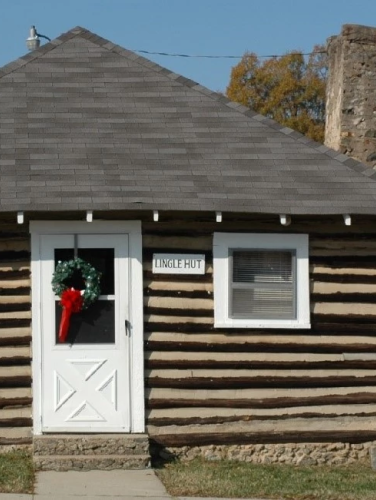
Unity Church Cabin / Lingle Hut
(ca. 1932)
The Lingle Hut has served for decades as a cherished community center for two longstanding Davidson church congregations.
219 Watson St, Davidson, NC 28036
The Unity Church Cabin (renamed the Lingle Hut in the late 1960s) is significant as Mecklenburg County’s first Depression-era, Rustic Revival communally built log building. The county had a long and significant tradition of log construction before the end of the nineteenth century. Like other areas throughout the United States, however, the proliferation of sawmills and the ready availability of prefabricated building materials via improved railroad transportation prompted an overwhelming and practically irreversible transition toward frame construction. When the severe economic downturn of the Depression hit, new construction across the United States nearly came to a standstill, prompting Americans to resort to less-costly techniques.
Property Quick Links
Despite the shift to frame construction, the rustic character of log structures remained fixed in the American imagination as a symbol of humble beginnings and self-sufficiency, often getting adapted for more grandiose structures like Asheville’s Grove Park Inn or Linville’s All Saints Episcopal Church. The Depression prompted a flurry of Rustic Revival style log buildings sponsored by the Civilian Conservation Corps and the Work Progress Administration due primarily to lower construction costs, the relatively few resources needed for such buildings, and the opportunity such construction provided to put as many people as possible to work. But the Unity Church Cabin predated those efforts.
The Unity Church, founded in 1890 as a nondenominational church by Delburg Cotton Mill operator J. P. Munroe, served Davidson’s working class families who lived west of the AT&O rail line. Initially called the Mill Chapel, the church offered services usually led by members of the Davidson College community, including students. With the guidance of student pastor John Howard and the assistance of the local YMCA, the congregation reorganized in 1932 as the interdenominational Unity Church and built the cabin as a community center for its members. The cabin became a central focus of the church’s operations, hosting Sunday school classes, Bible studies, quilting bees, fish fries, barbeques, and Boy Scout meetings. The County nurse even used the cabin to administer inoculations to town residents. Expansions in 1949 and the 1950s added bathrooms and a kitchen to the cabin.
In 1949, the Unity congregation joined the Presbyterian Church, becoming Calvary Presbyterian Church. Calvary’s continued growth required the construction of a new sanctuary on South Street in 1966, prompting the sale of its Watson Street property and cabin to Reeves Temple A.M.E. Zion Church, then located on Eden Street. Funding for the purchase proved difficult for the Reeves Temple congregation until Cecelia Connor, a lifelong member and longtime employee of the family of Davidson College president Walter Lingle, contacted Walter Lingle Jr. for assistance. Then a vice president for Proctor and Gamble, Walter Jr. contributed $15,000 to the congregation’s fundraising efforts on the condition that the Unity Church Cabin be renamed the Lingle Hut in honor of his mother Louise Lingle, who had taught Sunday school for many years at Unity Church. That additional funding allowed the congregation to purchase the former Cavalry property. The new facilities accommodated more parishioners, had the advantage of indoor plumbing, and offered the additional amenity of the renamed Lingle Hut that the Reeves Temple congregation continues to use as a community center for its members.

